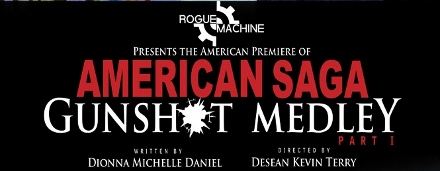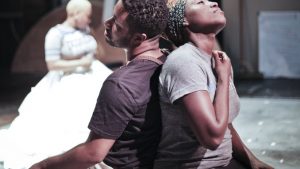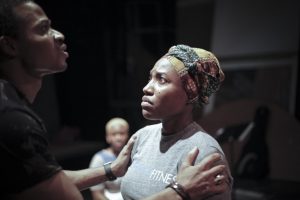MURDER WITHOUT END
Sha’Leah Nikole Stubblefield is already a mesmerizing, ethereal presence on stage when you take a seat for Rogue Machine’s American Saga Gunshot Medley: Part 1, now in its American premiere at the MET Theatre. She is the High Priestess of Souls, perched in a graveyard, resplendent in a vermillion gown. Her garment extends, spreading out in perhaps a six-foot radius on the floor around her.
Live musicians play. She feels the rhythms, swaying and snapping, offering an otherworldly invitation. Lights dim. Gunshots ring out. The preshow meditation is over and Dionna Michelle Daniel’s brilliant play begins. Its dreaminess solidifies into the iron grip of a nightmare, made all the more inescapable by its strange beauty. This is a work of tragic majesty.
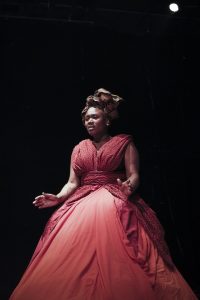 Three slaves, Betty, George, and Alvis tend their posts in the cemetery, trapped in a nether world. “A few hours, a month, a year… it’s all the same here.” Betty repeatedly reenacts a ritual: She is unexpectedly shot, often in the middle of a sentence. She clutches her side and falls to her knees, desperately scrubbing away the blood around a whipping post. She is on an urgent mission. To cleanse away the past? Or is this about the present? And if so, whose present? Hers? Ours?
Three slaves, Betty, George, and Alvis tend their posts in the cemetery, trapped in a nether world. “A few hours, a month, a year… it’s all the same here.” Betty repeatedly reenacts a ritual: She is unexpectedly shot, often in the middle of a sentence. She clutches her side and falls to her knees, desperately scrubbing away the blood around a whipping post. She is on an urgent mission. To cleanse away the past? Or is this about the present? And if so, whose present? Hers? Ours?
Alvis is exuberant and by turns childlike and gleefully sexual. He brings Betty found treasures (a Skittles wrapper, a lottery ticket) and asks her to clean them. She starts wiping each time and is then horrified by what she sees, ordering Alvis to put them back, to bury these reminders of something so horrible she can barely remember or acknowledge it. Alvis is entranced by modern music and dance, pulling Betty to moments of joy that quickly recede. Another shot. More pain. Falling. Scrubbing.
George is in an altogether different frame of mind. His attention is on a monstrous reality unfolding around them and a pivotal change he believes is coming. He resolves to cross over to the other side and command the living to go to war and seek reparations. Betty and Alvis preach love. “Does love win wars?” George asks. “Love will get you killed.” Betty knows it is true. “I have to learn how to create a bullet-proof child,” she mourns, “A warrior child.”
The High Priestess watches, waits, and sings of tenderness, love, and pain. She is a New World echo of Oya, the Yoruba deity of wind, storms, and the eternal cycle of birth, life, death, and rebirth. The circle of red around her emerges as a constant reminder of blood extending across centuries, through antebellum plantation whipping posts, lynchings, beatings, rapes, family annihilations, and Black (mostly) young men being gunned down by police officers.
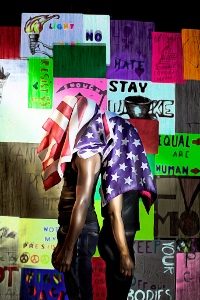 Mysteries unfold, at first in a kind of Twilight Zone fashion, as pieces of the puzzle come together. But brutality and loss rapidly plunge us into a depth of feeling that is worlds away from Rod Serling. This is not a cautionary tale. We cannot gain wisdom and avoid it. We are as locked within it as the ghosts before us, drowning in the endless blood of an ugliness that defines us all, whether we know it or not.
Mysteries unfold, at first in a kind of Twilight Zone fashion, as pieces of the puzzle come together. But brutality and loss rapidly plunge us into a depth of feeling that is worlds away from Rod Serling. This is not a cautionary tale. We cannot gain wisdom and avoid it. We are as locked within it as the ghosts before us, drowning in the endless blood of an ugliness that defines us all, whether we know it or not.
A day later the emotional impact still resonates. I saw the actors last night in my dreams. I heard their voices along with the discordant melody of music and gunshots. This is what theater is for, it’s why it matters. The narrative has some modern correlations that didn’t immediately occur to me. My husband explained them on the way home. But even if you don’t get the specific meaning behind each gunshot, I don’t think it matters. You understand completely that past exists as present and future. Every gunshot is a death, and every person who dies is someone’s child.
At the performance I saw, Mildred Marie Langford and Jon Chaffin played Betty and George. (Cherise Boothe and Donathan Walters play the characters at alternate performances.) Langford and Chaffin are both as brilliant here as they were last season in the Antaeus Theatre Company’s production of Native Son, he as Bigger Thomas, she in the dual roles of his sister and wife. It is a fascinating contrast. Rage and fear drove their performances in Native Son, but here they are called upon to inhabit a more splintered, mercurial emotional landscape.
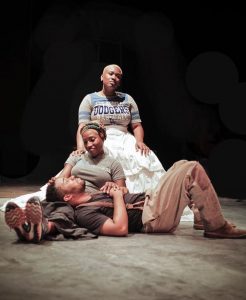 As Alvis, Derek Jackson is jubilant and graceful. He doesn’t tip us off to the character’s pain. His anguish arrives in an instant, fully formed. Sha’Leah Nikole Stubblefield has a preternatural stillness that is sometimes gentle, sometimes galvanizing. She is also a fantastic singer. Musicians Gerald C. Rivers, Crissy Joyce, and Anne Polednak provide a kind of sweet counterpoint to the dissonance of gunshots. They are as vital to the production as the actors.
As Alvis, Derek Jackson is jubilant and graceful. He doesn’t tip us off to the character’s pain. His anguish arrives in an instant, fully formed. Sha’Leah Nikole Stubblefield has a preternatural stillness that is sometimes gentle, sometimes galvanizing. She is also a fantastic singer. Musicians Gerald C. Rivers, Crissy Joyce, and Anne Polednak provide a kind of sweet counterpoint to the dissonance of gunshots. They are as vital to the production as the actors.
Desean Kevin Terry directs with bold and imaginative expansiveness, creating a kinetic sense of movement and drama in harmony with his excellent design team. Lighting designer Tor Brown, set designer Priti Donde, and sound designer Jeff Gardner create a dreamy, captivating universe. Costume designer Wendell C. Carmichael’s gown for the High Priestess is a stunner, but his other costumes are equally effective, if less showy. Musical director Calvin L. Blake III’s arrangements are lush and satisfying. Choreographer Christopher Eclipse provides moments of happy transcendence.
On October 5, the production moves to the Watts Village Theatre, under the artistic direction of Bruce Lemon. He and Rogue Artistic Director John Perrin Flynn have committed to bringing theater to underrepresented communities. Imagining this as possibly someone’s first taste of live theater is thrilling. It will hook them for life.
photos by Cristian Kreckler
Gunshot Medley: Part 1
part of American Saga: A Theatrical Ballad series
Rogue Machine Theatre
MET Theatre,1089 N. Oxford Ave | Fri, Sat & Mon at 8; Sun at 2
ends on September 23, 2018
WLCAC Theatre, 10950 S. Central Ave
plays October 5-14 | Fri & Sat at 8; Sun at 2
for tickets, call 855.585.5185 or visit Rogue Machine
for more info, visit WLCAC (Watts Labor Community Action Committee)
